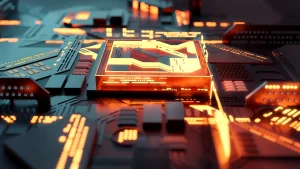Storage solutions are an essential component of any computing setup, whether you’re using a laptop for personal use or managing a data centre.
The two primary types of storage drives you’ll encounter today are Solid State Drives (SSD) and Hard Disk Drives (HDD).
Given the various options and specifications, choosing between these two can be rather perplexing. This blog aims to unravel the complexities so you can make an informed decision between SSDs and HDDs.
What is a Hard Disk Drive (HDD)?
Hard Disk Drives have been around for decades and have continually evolved to offer greater storage capacities and speeds.
They were the go-to choice for most consumers and businesses alike until SSDs came onto the scene.
The basic mechanics of an HDD include magnetic platters and a read/write head that moves to read or write data.
The speed at which the platters rotate, often denoted in revolutions per minute (RPM), significantly impacts the drive’s performance.
HDDs are generally suitable for large storage needs at a budget-friendly price point.
They are commonly found in desktop computers, external storage solutions, and some budget laptops.
What is a Solid State Drive (SSD)?
Solid State Drives are relatively new in comparison to HDDs but have quickly gained mainstream adoption due to their superior speed and reliability.
They first began to appear in high-end laptops and have now become commonplace in many consumer devices.
SSDs use NAND-based flash memory to store data, which provides quick read and write speeds.
Unlike HDDs, SSDs don’t have moving parts, which makes them more durable and faster.
As for their application, SSDs are ideal for tasks that require high-speed data transfer, such as booting up an operating system, launching software applications, or editing high-definition video.
Speed and Performance
When it comes to speed, SSDs are the clear winners. They can read and write data much faster than HDDs, which means quicker boot times, faster file transfers, and more efficient software performance.
The speed advantage is particularly noticeable when you’re booting up your computer.
With an SSD, you can expect your system to be up and running in a fraction of the time it would take with an HDD.
Real-world scenarios further exemplify these speed differences.
Whether it’s transferring large files or loading game levels, SSDs offer a noticeably smoother and faster experience.
Durability and Longevity
HDDs contain mechanical parts like magnetic platters and read/write heads that make them vulnerable to wear and tear, as well as damage from physical shocks.
Even small disruptions can cause data loss or complete failure of the drive.
On the other hand, SSDs are much more robust. They lack moving parts, making them resistant to physical damage.
If you’re someone who travels frequently or just wants to ensure your data is as secure as possible, SSDs are a reliable option.
While both SSDs and HDDs have a finite lifespan, SSDs generally last longer because they’re not subject to mechanical failure.
However, it’s essential to remember that all drives can fail, so regular backups are advisable.
Storage Capacity and Cost
HDDs generally offer more storage capacity for your money. It’s not uncommon to find HDDs with several terabytes of storage at a relatively low cost.
They are a cost-effective solution for users who require a lot of storage space but aren’t overly concerned with speed.
SSDs are generally more expensive per gigabyte. While prices have been falling, you’ll still pay a premium for the speed and durability advantages they offer.
If you’re a casual user, you may find an HDD to be sufficient. However, professionals or those who need high performance may consider the extra cost of an SSD to be a worthy investment.
Making the Choice
In summary, your choice between an SSD and an HDD should be influenced by your specific needs and what you find most crucial—speed, durability, or cost.
For tasks requiring quick data access or where durability is a concern, SSDs are the better option. However, if you need a large storage capacity without breaking the bank, HDDs are still a viable choice.
Conclusion
Choosing between an SSD and an HDD is a significant decision that can affect your computing experience.
Armed with the information presented in this blog, you can make a more informed choice that aligns with your needs and preferences.
Whether you opt for the speed and durability of an SSD or the cost-effective, high-capacity nature of an HDD, the right storage drive can significantly enhance your digital life.



